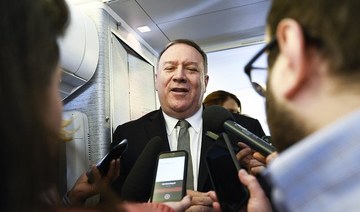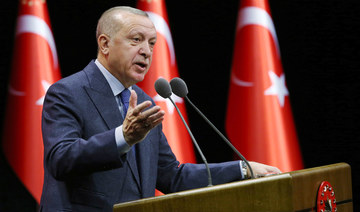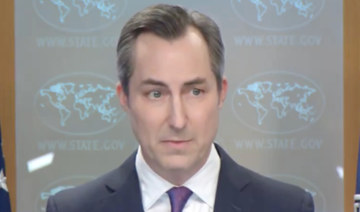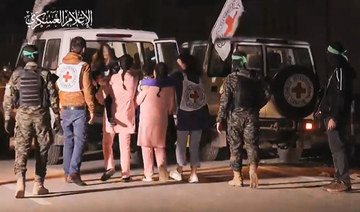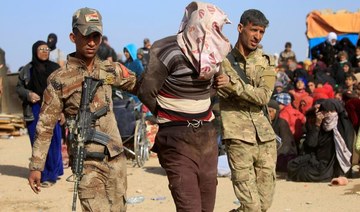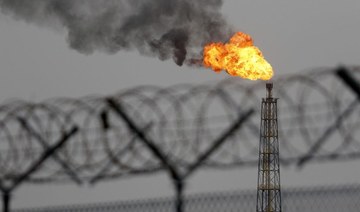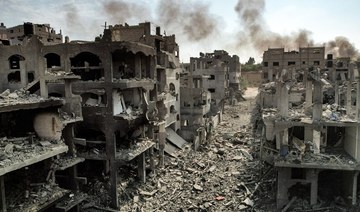TEHRAN: Iranians vote next week in a crucial parliamentary election that is widely expected to herald the return of conservatives and heap pressure on beleaguered President Hassan Rouhani.
Friday’s vote comes after months of steeply escalating tensions between Iran and its decades-old arch enemy the United States.
The Guardian Council, the body that rigorously vets candidates, disqualified more than half of the 14,444 who sought to stand — including dozens of mostly moderate and reformist incumbents.
A week of campaigning for seats in the Majles kicked off Thursday with little fanfare.
Faced with the stark choice of voting for the conservatives and whether or not to vote at all, those who backed Rouhani in the past see this election as a lost cause and are expected to stay away in droves.
“The majority of the current parliament is composed of reformists, and people believe that they haven’t done anything serious” since being elected in 2016, said independent journalist Farshad Ghorbanpour.
“The Iranian people have come to the conclusion that their choice has no impact,” he told AFP.
The purge of candidates was “unprecedented,” said Ghorbanpour.
“Even some conservatives who were likely to speak independently and rationally in parliament have been disqualified.”
Iranians are feeling the strain after months of turmoil.
In November, nationwide demonstrations over petrol price hikes turned violent before being crushed in a deadly crackdown.
Bread and butter issues have put Rouhani’s alliance at risk of losing in a landslide.
A salesman in Tehran’s Grand Bazaar summed up the mood, saying he would abstain as voting seemed “useless.”
Asked what might convince him to change his mind, Mostafa Hamidi, 37, said it would be if those in power lived up to “at least one of their promises. Just one, not 1,000.”
Another voter expressed despair over the country’s mismanagement.
“The truth is that whenever we have voted, things never improved but got worse,” said Morteza Jaberi, who works in a motorbike repair shop in Tehran’s run-down Molavi neighborhood.
“Our country is very powerful in all fields, but there are people in charge who cannot use this power properly,” the 38-year-old told AFP.
Rouhani, a moderate conservative, came to power promising greater social freedoms and the benefits of engagement with the West.
But his signature achievement — a 2015 nuclear deal that was meant to give Iran relief from sanctions — is now in tatters.
In 2018 US President Donald Trump unilaterally withdrew from the agreement that froze Iran’s nuclear program and began reimposing crippling sanctions.
Tehran and Washington have been sworn enemies since 1979.
But they have never come as close to a direct confrontation as in the past seven months, when it has happened twice, most recently after the US killed prominent Iranian general Qasem Soleimani on January 3.
The “martyrdom” of the hugely popular general provoked an outpouring of grief in Iran.
Millions from all walks of life turned out to mourn his death.
But that unity suffered a blow after Iran admitted it “accidentally” shot down a Ukrainian airliner, killing all 176 people aboard.
The disaster, which claimed the lives of many students studying abroad, sparked more protests that turned political.
At stake in the February 21 election are 290 seats.
The disqualifications can only benefit Rouhani’s conservative rivals whose solid support base always shows up at elections and has been spurred by the tense standoff with the United States.
Rouhani has repeatedly railed against the disqualifications, saying they threaten Iran’s democracy.
“The greatest danger for democracy and national sovereignty is the day when elections become a formality,” he said last month.
In the absence of real opponents, a grand coalition of “principalists” — or conservatives — looks set to win in a landslide.
The Majles drafts legislation, ratifies international treaties and approves the budget.
But while it has been “increasingly sidelined in the decision-making process,” a swing to hard-liners may make Rouhani’s life difficult, said Ellie Geranmayeh, analyst at the European Council on Foreign Relations.
The vote is also seen as an opportunity to gauge the electorate.
“The outcome should give a decent sense of popular opinion — important in a country where quality public opinion polling is rare,” said Henry Rome, Iran analyst at Eurasia Group.
“The election will also provide an early indicator of the outlook for the presidential election in mid-2021.”
But Rouhani’s coalition was unlikely to survive, he said.
“A right-wing parliament will torment Rouhani during his final year in office... complicating the government’s ability to respond to sanctions pressures,” said Rome.
“In contrast, if a right-wing president wins in 2021, the parliament can enable that leader to move quickly on new initiatives.”
Polling stations are to open at 8:00 am (0430 GMT) on Friday and close 10 hours later. Results are expected in the days after the election.
Iran to vote in general election many see as ‘lost cause’
https://arab.news/2jq6j
Iran to vote in general election many see as ‘lost cause’
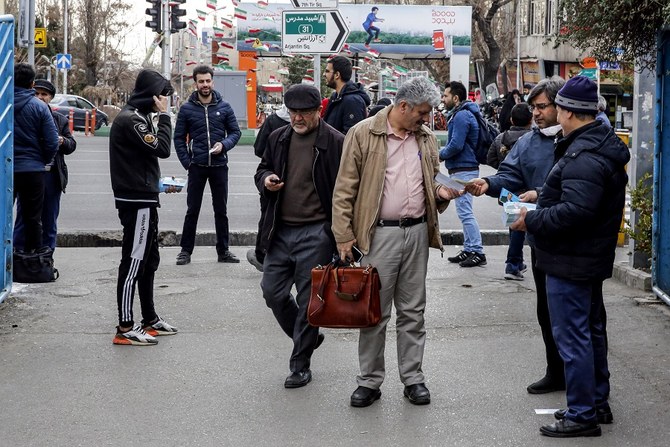
- Friday’s vote comes after months of steeply escalating tensions between Iran and the US
- Those who backed Rouhani in the past see this election as a lost cause and are expected to stay away in droves
Hamas releases video showing well-known Israeli-American hostage
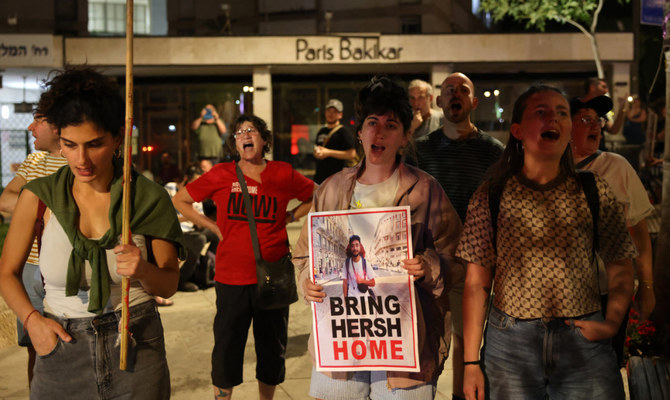
- Goldberg-Polin is one of the most recognized captives. Posters with his image are pinned up across Israel
JERUSALEM: Hamas released a hostage video on Wednesday showing a well-known Israeli-American man who was among scores of people abducted by the militants in the attack that ignited the war in Gaza.
The video was the first sign of life of Hersh Goldberg-Polin since Hamas’ Oct. 7 attack on southern Israel, and its release ignited new protests in Jerusalem calling on the government to do more to secure the captives’ release.
In the video, Goldberg-Polin accused Israel’s government of abandoning the people who are being held hostage by Hamas. He also claimed that some 70 captives have been killed in Israel’s bombing campaign. Goldberg-Polin was clearly speaking under duress, and the claim could not be independently verified. It was not clear when the video was made.
Goldberg-Polin, 23, was at the Tribe of Nova music festival when Hamas launched its attack from nearby Gaza. In the video, Goldberg-Polin is missing part of his left arm.
Witnesses said he lost it when attackers tossed grenades into a shelter where people had taken refuge. He had tied a tourniquet around it before being bundled into the truck by Hamas.
Goldberg-Polin is one of the most recognized captives. Posters with his image are pinned up across Israel. His mother, Rachel Goldberg, has met with world leaders and addressed the United Nations.
Though there was no date on the video, Goldberg-Polin appeared to reference the weeklong Jewish holiday of Passover, which began on Monday.
His parents said they were relieved to see him alive but were concerned about his health and well-being, as well as that of the other hostages.
“We are here today with a plea to all of the leaders of the parties who have been negotiating to date,” said his father, Jon Polin, naming Egypt, Israel, Qatar, the United States and Hamas.
“Be brave, lean in, seize this moment and get a deal done to reunite all of us with our loved ones and end the suffering in this region,” he said.
Hostages’ families have accused Israeli Prime Minister Benjamin Netanyahu’s government of not doing enough to secure the release of their relatives.
After the Hamas video was made public, hundreds of Israelis gathered outside Netanyahu’s official residence in central Jerusalem on Wednesday, calling on the government to strike a deal to bring home hostages. Many held posters of Goldberg-Polin, and some of the protesters set cardboard boxes on fire.
“We are afraid for his life, so we went to protest and call for the government to do whatever is possible to bring him and everybody else back, as soon as possible,” said one of the marchers, Nimrod Madrer. “Bring them back home,” the crowd chanted.
At the nearby Great Synagogue, a large crowd jeered the country’s ultranationalist national security minister, Itamar Ben-Gvir, chanting “shame” as he exited the building following a Passover gathering. One protester banged on Ben-Gvir’s car and was pushed away by police as it drove off.
Hamas and other militants abducted around 250 people in the Oct. 7 attack and killed around 1,200, mostly civilians. They are still believed to be holding around 100 hostages and the remains of some 30 others. Most of the rest were freed in November in exchange for the release of 240 Palestinians imprisoned by Israel.
Khalil Al-Hayya, a senior Hamas official, said Goldberg-Polin’s family had asked mediators to inquire about his fate for humanitarian reasons.
His family was “searching the world for any sign of him,” Al-Hayya said in an interview with Hamas-run Al-Aqsa TV broadcast on Wednesday. Hamas’ armed wing ”sent a strong message by publishing this young man’s message directed at Netanyahu,” Al-Hayya said.
The US, Qatar and Egypt have spent months trying to broker another ceasefire and hostage release, but the talks appear to have stalled. Hamas has said it will not release the remaining hostages unless Israel ends the war, which has killed over 34,000 Palestinians, according to local officials.
Netanyahu has rejected those demands, and says Israel remains committed to destroying Hamas and bringing all the hostages home. He has come under mounting criticism in Israel, where some say it will be impossible to do both.
Wars in Gaza and Sudan ‘drive hunger crisis affecting 280 million worldwide’
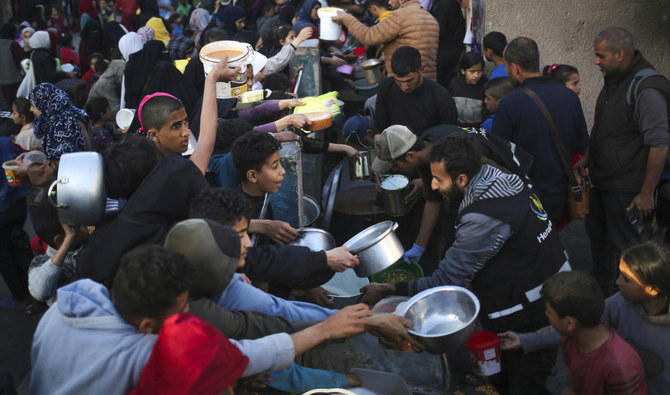
- New report on global food insecurity says outlook for 2024 is ‘bleak’
JEDDAH: More than 280 million people worldwide suffered from acute hunger last year in a food security crisis driven by conflicts in Gaza and Sudan, UN agencies and development groups said on Wednesday.
Economic shocks also added to the number of victims, which grew by 24 million compared with 2022, according to a report by the Food Security Information Network.
The report, which called the global outlook for this year “bleak,” is produced for an international alliance of UN agencies, the EU and governmental and non-governmental bodies.
Food insecurity is defined as when populations face food deprivation that threatens lives or livelihoods, regardless of the causes or length of time. More geographical areas experienced “new or intensified shocks” and there was a “marked deterioration in key food crisis contexts such as Sudan and the Gaza Strip,” said Fleur Wouterse, a senior official at the UN’s Food and Agricultue Organization.
Since the first report by the Global Food Crisis Network covering 2016, the number of food-insecure people has risen from 108 million to 282 million, Wouterse said. The share of the population affected within the areas concerned had doubled from 11 percent to 22 percent, she said.
Protracted major food crises are ongoing in Afghanistan, the Democratic Republic of Congo, Ethiopia, Nigeria, Syria and Yemen. “In a world of plenty, children are starving to death,” UN Secretary-General Antonio Guterres said.
“War, climate chaos and a cost-of-living crisis, combined with inadequate action, mean that almost 300 million people faced acute food crisis in 2023. Funding is not keeping pace with need.”
According to the report, situations of conflict or insecurity have become the main cause of acute hunger. For 2024, progress would depend on the end of hostilities, said Wouterse, who said aid could rapidly alleviate the crisis in Gaza or Sudan, for example, once humanitarian access to the areas was possible.
Yemen’s Houthis say they targeted American and Israeli ships
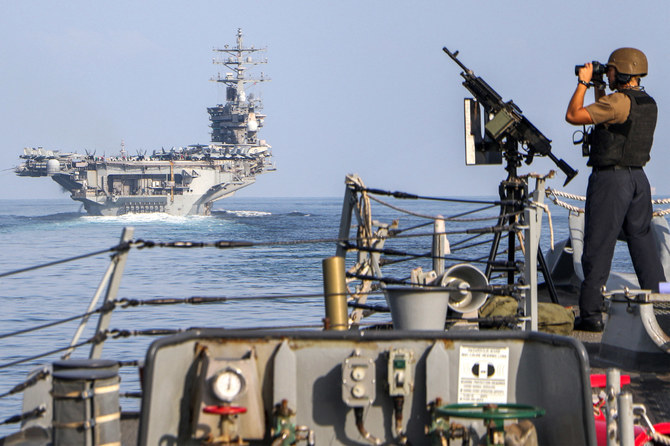
- The Iran-aligned group said it targeted the US ship Maersk Yorktown, an American destroyer in the Gulf of Aden and Israeli ship MSC Veracruz in the Indian Ocean
- “The Yemeni armed forces confirm they will continue to prevent Israeli navigation,” Sarea said
CAIRO/DUBAI: Houthi militants in Yemen have attacked what they said were two American ships and an Israeli vessel, the group’s military spokesman said on Wednesday, the first such attack in more than two weeks.
The Iran-aligned group said it targeted the US ship Maersk Yorktown, an American destroyer in the Gulf of Aden and Israeli ship MSC Veracruz in the Indian Ocean, the spokesman, Yahya Sarea, said in a televised speech.
Yemen’s Houthis have been attacking ships in the Red Sea region since November in what they say is a campaign of solidarity with Palestinians fighting Israel in Gaza.
“The Yemeni armed forces confirm they will continue to prevent Israeli navigation or any navigation heading to the ports of occupied Palestine in the Red and Arabian Seas, as well as in the Indian Ocean,” Sarea said on Wednesday.
Separately, British maritime security firm Ambrey said earlier on Wednesday that it was aware of an incident southwest of the port city of Aden, an area where the Houthis often target ships they say are linked to Israel or the United States.
The vessel reported an “explosion in the water” approximately 72 nautical miles east-southeast of Djibouti, an updated advisory from Ambrey said.
Houthi attacks have disrupted global shipping through the Suez Canal, forcing firms to re-route to longer and more expensive journeys around southern Africa. The United States and Britain have launched strikes on Houthi targets in Yemen.
Iraq hangs 11 convicted of ‘terrorism’: security, health sources
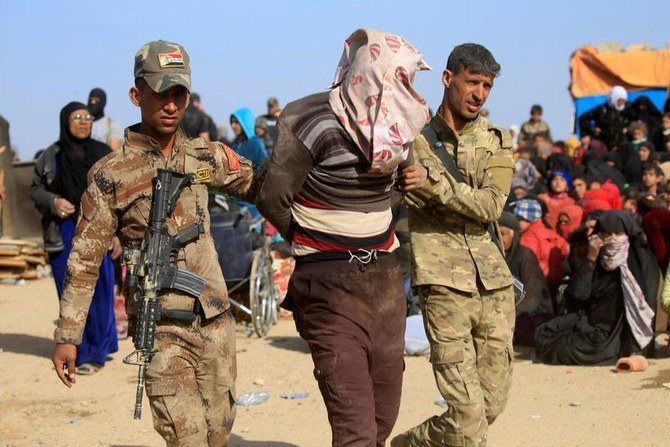
- Under Iraqi law, terrorism and murder offenses are punishable by death, and execution decrees must be signed by the president
- A security source in Iraq’s southern Dhi Qar province told AFP that 11 “terrorists from the Daesh group” were executed by hanging at a prison in Nasiriyah
NASIRIYAH, Iraq: Iraqi authorities have executed at least 11 people convicted of “terrorism” this week, security and health sources said Wednesday, with rights group Amnesty International condemning an “alarming lack of transparency.”
Under Iraqi law, terrorism and murder offenses are punishable by death, and execution decrees must be signed by the president.
A security source in Iraq’s southern Dhi Qar province told AFP that 11 “terrorists from the Daesh group” were executed by hanging at a prison in the city of Nasiriyah, “under the supervision of a justice ministry team.”
A local medical source confirmed that the health department had received the bodies of 11 executed people.
They were hanged on Monday “under Article 4 of the anti-terrorism law,” the source added, requesting anonymity due to the sensitivity of the issue.
All 11 were from Salahaddin province and the bodies of seven had been returned to their families, the medical official said.
Iraqi courts have handed down hundreds of death and life sentences in recent years for people convicted of membership in “a terrorist group,” an offense that carries capital punishment regardless of whether the defendant had been an active fighter.
Iraq has been criticized for trials denounced by rights groups as hasty, with confessions sometimes obtained under torture.
Amnesty in a statement on Wednesday condemned the latest hangings for “overly broad and vague terrorism charges.”
It said a total of 13 men were executed on Monday, including 11 who had been “convicted on the basis of their affiliation to the so-called Daesh armed group.”
The two others, arrested in 2008, “were convicted of terrorism-related offenses under the Penal Code after a grossly unfair trial,” Amnesty said citing their lawyer.
Biden says Israel must allow aid to Palestinians ‘without delay’
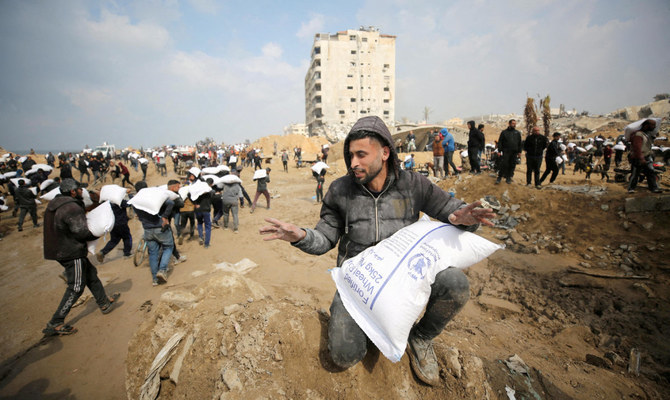
- “We’re going to immediately secure that aid and surge it,” Biden said
- “Israel must make sure all this aid reaches the Palestinians in Gaza without delay“
WASHINGTON: President Joe Biden on Wednesday demanded that new humanitarian aid be allowed to immediately reach Palestinians in the Gaza Strip as key US ally Israel fights Hamas there.
“We’re going to immediately secure that aid and surge it... including food, medical supplies, clean water,” Biden said after signing a massive military aid bill for Israel and Ukraine, which also included $1 billion in humanitarian aid for Gaza.
“Israel must make sure all this aid reaches the Palestinians in Gaza without delay,” he said.
US-Israel relations have been strained by Israel’s conduct of the war in Gaza and Israeli Prime Minister Benjamin Netanyahu’s plan to send troops into the southern Gazan city of Rafah, where 1.5 million people are sheltering, many in makeshift encampments.
“This bill significantly — significantly — increases humanitarian assistance we’re sending to the innocent people of Gaza who are suffering badly,” Biden said.
“They’re suffering the consequences of this war that Hamas started, and we’ve been working intently for months to get as much aid to Gaza as possible.”



